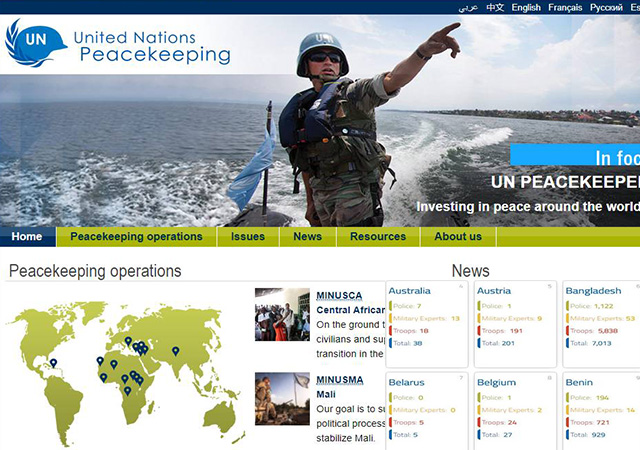 UN Peacekeeping website. Right inset: From 2017 table on country peacekeeping contributions.
UN Peacekeeping website. Right inset: From 2017 table on country peacekeeping contributions.
Bangladesh has started its third decade of United Nations Peacekeeping Operations (UNPKO) engagement with new responsibilities and challenges. Up to December 2015, Bangladesh has been participating in ten UN peacekeeping operations, some of which like the missions in Liberia, Ivory and DRC continued from the second decade. Bangladesh has also contributed troops to Mali, Central African Republic (CAR), South Sudan, and Western Sahara in 2013–14.
The changing nature of the peace operations all over the world has generated more expectations from the TCCs with regard to the protection of the civilians, collection of intelligence in the conflict-prone areas, use of sophisticated technologies in reducing casualties of all concerned stakeholders, among others. In addition, the UN New Partnership Agenda: Charting a New Horizon for United Nations Peacekeeping report offers an ambitious agenda to develop capacities of TCCs and PCCs in bolstering the effectiveness of peacekeeping. For Bangladesh, this requires a broadening of internal and external partnerships with the UN and regional organisations in future. This report is known as The New Horizon Report.
United Nations Operation in Côte d’Ivoire (UNOCI) started in 2004 and Bangladesh has been contributing to this mission since its inception. In the last ten years of UNOCI, the involvement of Bangladeshi troops has been transformed with the changing mandates of the mission.
As of January 2015, Bangladesh maintains two infantry battalions, signal, medical and engineering corps in strategically significant districts of Côte d’Ivoire. The Bangladeshi Battalion (BANBAT) lies in the North-Western part of the Côte d’Ivoire, covering an area of about 55,320 sq km. This is a volatile zone and is bounded by Mali to the North, Guinea and Liberia to the West. The peacekeepers have to maintain regular patrols to protect the civilians from diverse threats coming across the borders. Bangladeshi troops provided enormous support to the 2010 national election and local elections in 2013.
The signal corps of BANBAT supported the Independent Election Commission (IEC) of the Côte d’Ivoire with high frequency radio technologies to maintain communications with the regional election offices. The Bangladesh Army also provided these communication facilities to the Integrated Command Centre (ICC) in Côte d’Ivoire during the 2010 national elections, which have contributed to averting grave security situations during the election period.
The Bangladeshi contingent received Force Commander’s commendation for the successful completion of the local and regional elections in April 2013. Bangladeshi troops also supported the routine tasks of the Ivorian Security Forces (ISF), which included joint patrols with the ISF in the adjacent areas rendered by transportation from the UN. Bangladeshi peacekeepers conducted civil-military cooperation and humanitarian assistance programmes like constructing schools in local areas. They have provided training to local farmers on seasonal cultivation along with introducing agricultural know-how under a project ‘Live Green’. Bangladeshi troops have conducted medical camps, distributed free drinking water and medicines to the locals. These activities made BANBAT popular among the local population. The wide-range of activities of the Bangladeshi troops, in its third decade of peacekeeping reflects strong commitment for multidimensional peace support operations under the auspices of the United Nations.
Bangladesh enhanced its rapid deployment levels by contributing troops to the UN-led mission in Mali (MINUSMA). It sent a 112-member contingent of Bangladesh Army in April 2014 with a commitment of sending six contingents of battalion size and a naval unit. As of December 2014, Bangladesh has deployed roughly thirteen hundred troops in Mali. Another recent deployment of Bangladeshi troops took place in UN Multidimensional Integrated Stabilisation Mission in Central African Republic (MINUSCA). In April 2014, UNSC approved a 12000-strong force considering the deteriorating condition of Central African Republic.
Despite the need for a rapid deployment of soldiers, the UN and TCCs were unable to coordinate a swift allotment of troops in MINUSCA. Bangladesh has already contributed nearly a contingent of approximately 900 soldiers from Bangladesh Army in this mission. Three soldiers were badly injured due to an ambush conducted by the rebels in October 2014.
Both Mali and CAR pose the growing trend of asymmetric threats involved in the UN peacekeeping operations in the contemporary time. In spite of all these challenges, the Government of Bangladesh has committed to send troops as per requirements of the UN. In the 2015 UN Summit on Peacekeeping Operations, the Prime Minister of Bangladesh reiterated her government’s support to train the blue helmets for quickest deployment, and provide infantry battalions, formed police units, helicopters, technical units, and other assets to fulfil the needs in peacekeeping missions. She also mentioned about the adoption of a national peacekeeping strategy paper that would prepare Bangladesh to better respond to the growing needs of the multidimensional missions. All suggest that Bangladesh is serious about ensuring steadfast support to difficult UN peacekeeping missions and also adamant about holding on to the country’s position as a top troop contributing country.
Both contributors are with the Department of International Relations, University of Dhaka, Bangladesh.
This excerpt is from a special edition of the Round Table Journal on peacekeeping.



